#because he just can’t understand it
Text
Surely like, I mean the Mafia doesn’t care how they get their money right? Like so long as they’re getting the 80% of how much an exy player would make why would they care. So I present to u : Jean Moreau fucking off and becoming a really famous artist instead
#every. single. one.#of his conversations with Kevin#is Kevin trying to get him to play again#because he just can’t understand it#and Jean is SO GOOD and it’s SUCH A WASTE#and Jean just thinks annoying Kevin is another bonus of the job#it was mostly an accident#he did a sculpture for a college competition#and now suddenly he’s famous for something other than exy#and he kinda hates the sport anyway#he just follows wherever Jeremy’s team goes and complains about it not being inspirational enough#god i love him#jean moreau#i love jean moreau#jean moreau is gay#jean moreau deserves the world#jerejean#aftg#all for the game#aftg series#aftg hc#aftg kevin#aftg jean#aftg headcanon#aftg jeremy
174 notes
·
View notes
Text
the thing is, we were never meant to sympathize with luke when he betrays percy. we aren’t meant to see his inner turmoil. we aren’t meant to see hesitancy, or regret. it’s meant to be a slap in the face. luke takes percy to the woods knowing full well what he’s about to do. in tlt kronos orders him to kill percy because he’s too volatile; kronos said so himself when percy hijacked luke’s dreams and began to figure out there were bigger things at play. the thing is, when kronos orders luke to kill percy, he doesn’t hesitate. that’s the point!!! it is essential that luke is so blinded by rage and vengeance for the gods that he will stop at nothing to get what he wants (the god’s destruction). percy accuses luke that kronos is using him, but he just retaliates that the gods do the same, and they do!!! but see, the thing is, luke’s whole point is that he’s so focused on the god’s injustices that he forgets what’s important. he goes for the “greater good” but he destroys his family, his life, in the process. by attempting to dismantle a system, he turns to another system that follows the same oppressive logic. THAT is why luke fails. THAT is why it’s so important he be blinded by rage, because it’s his inevitable, tragic end. he’s doomed by the narrative from the start. yes, we’re meant to be surprised by his betrayal because of how cold and calculating it is, but also it’s important to set the grounds for luke’s character to be this angry, vengeful boy because later on we come to understand why it is that he made those choices. we see annabeth’s side of things and percy’s side. we see luke’s side. we see many sides. we see a man who is too far gone yet comes to understand, in the end, that he’s been doing more harm than good to those he was supposed to protect (annabeth is the most obvious example). we get a complex character who won’t hesitate to kill but who also won’t hesitate to sacrifice himself so that he can save the family he has left.
the thing is, luke was supposed to be angrier in the show. percy was supposed to be angrier in the show. they’re both foils. luke is what percy could become, if percy lets his anger win. so, to change—even if it’s only slightly altering—their characters, is to change the point of the story. because luke tries to kill percy in his betrayal and later percy tries to kill luke but then percy starts to understand luke…until luke is gone and kronos is gone yet the gods don’t change but percy does. and percy’s initial anger is supposed to transform and he’s supposed to see what luke saw and the cycle continues. the thing is, it’s not even one of the worst changes the show made, yet it’s still so, so telling that they failed to see why it’s important to let your characters do bad things, to make mistakes, because that’s how a story can carry on. that’s how you give a story depth.
#pjo adaptation#pjo tv show#rick crit#i have a lot of thoughts#pjo show crit#luke castellan#percy jackson#im talking abt pjo her btw even if i do reference hoo yet hoo wasn’t good either so all the conflict abt the gods not changing was there ye#never adressed. percy sympathizing with luke was never adressed either#yet it’s what would be natural especially since it was mentioned once#THATS ENOUGH FOR ME THO. u can’t tell me percy came to understand luke and that he’d do the same if he were in his shoes and annabeth or#some other loved one was taken from him because of the gods U JUST CANT
444 notes
·
View notes
Text
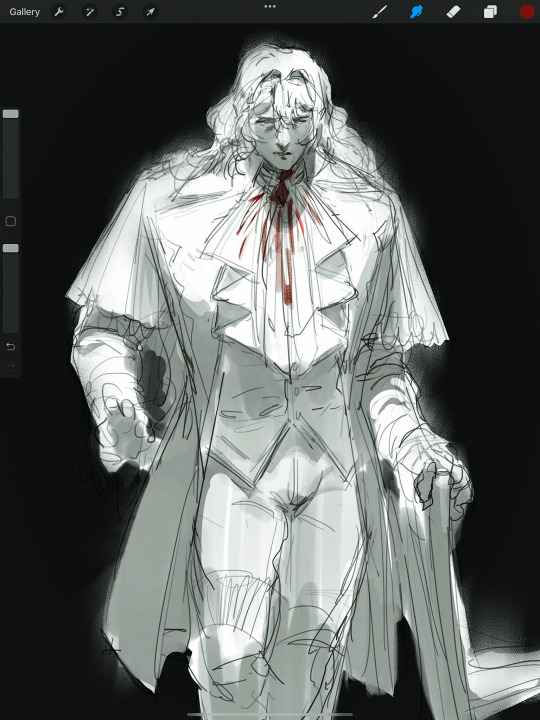
Please. I don’t want to hurt you.
Inspired by @wyvernne ’s vampluc
#sad and angsty vampire turned against his will and only drinks from animals because he sees himself as a monster#which leaves him incredibly weak and thirsty for real sustenance but he would rather drink his own blood than hurt you#his control will only last for so long!#sorry for being incredibly inactive and unresponsive with asks#lots of change in my life right now that’s leaving me incredibly anxious#can’t focus well so I just avoid things constantly. im sure someone can understand what I mean#oh well#diluc#my art#genshin impact#vampluc
441 notes
·
View notes
Text
Father had personally asked Feanor to stand for this portrait, so he was. Father had quietly suggested that perhaps this could be a painless exercise, which did not actually mean ‘painless’ but rather ‘silent’ for Feanor, but he agreed. Father told him this painting did not symbolize anything but his own desire to have a record of all his available loved ones around him, and Feanor was trying to see it that way- for the sake of his own sanity.
Because his stomach was roiling, and there was a heaviness in his chest, a great emptiness which his heart was pounding against, echoing, echoing, echoing.
Father had one hand on Feanor’s shoulder and the other was upon Indis’s. She was sat in front of them, smiling beautifully, little golden-haired Arafinwe in her lap. Around them, her three dark-haired children were gathered. Findis on Father’s other side, Nolofinwe with her, and Lalwen in front of Feanor.
To the unaware eye, Feanor knew, they must all look like they matched. Like they went together correctly. Like a family.
When the portrait was complete and those dark haired children were gathered around the mother and father, who would guess that one child was out of place? Who might glance at all that paint representing their faces and think anything but-
You could almost be her son, Feanor thought, and then his mind replied, But you’re not.
He was so still and he dared not move, because if he did, he’d never get back in place. If Feanor flinched once, the sharp, jagged pieces of him that never fit right in this puzzle would scratch one of them. They’d be annoyed and that would be it: he’d combust in anger, he’d shatter across the floor, snapping and snarling at everyone unnecessarily until he ruined their perfect little scene. Father said this might be a painless exercise. No, no; this was to be a silent, still exercise.
You could almost be her son. But you’re not.
How good a painter was this person Father hired? How varied his faces? Would he capture that Feanor’s nose resembled that of none of the people here? Could he represent that his frame was already different from his father and little half-brother’s?
Would he lie and throw a pleased smile on Feanor’s face? Not even Father had asked him to smile.
You could almost be her son. But you’re not.
Feanor’s presence made them fit together so symmetrically, maybe that was pleasing enough to hide the wrongness of this scene. Maybe that’s why Father made him come here today, the pretty scene. Why he asked him to suffer, even as the longer he stood here, the more and more Feanor felt like he was about to be sick all over the floor.
A ghost, a ghost, there was a ghost looming over their shoulders ruining this perfectly symmetrical scene. Couldn’t they feel her breathing down their necks, icy chill against sweat? Didn’t their perfectly posed heads feel her long, clever fingers wrapped lovingly around their necks?
You could almost be her son. But you’re not.
Feanor’s gaze slipped down to the back of Indis’s head. Her beautiful golden hair. She didn’t wear a crown, this was a family portrait, and that felt worse. So much worse.
If he let his eyes unfocus and his mind wander, he could try to lie to himself that her hair was much lighter and the faces of the children around them more closely resembled his own. The woman in front of him loved him, and she fussed over his hair before they sat for this portrait, and he’d let her do it.
The worst part was Feanor did know that Indis would help him with the ties of his robes, if only he let her.
You could almost be her son. But you’re not.
She’s not, she’s not, she’s not. It was a simple statement of fact. It was scandal enough that the father replaced the wife, when one at least chose a wife, but what freak replaced his own mother?
What would the people who saw this portrait think? Would they see Finwe’s happy family or would they see Feanor’s blaring, uncomfortable intrusion upon what gods and men declared to be a better order of things? Father wanted him to belong here, but he didn’t.
He just didn’t.
You could almost be her son. But you’re not.
A painless exercise. Painless, painless, painless, for them. Silent, still Feanor, a happy accessory to the triumphant union of Finwe and Indis, a grateful stray dog permitted to drink from the bowls provided by Indis’s family.
This exercise was just meant to capture the image of all Finwe loved, nothing more. Don’t think too hard about it, Feanor. You might make the children unhappy.
You could almost be her son. But you’re not.
You should pretend you are, though. That’ll make them like you.
Because they did so disdain him, most of the time. They disliked how he glared at their mother and started fights at family dinners and ignored them in the hallways. Why shouldn’t they? Feanor would hate a person who did those things to his family, too.
He just couldn’t stop, though. He wanted to, sometimes, when the exhaustion and loneliness caught up, and then he remembered that he wasn’t Indis’s son and never would be, and remembering that made him angry. Wouldn’t it just be so damn convenient for them all if he was almost her son?
But he wasn’t.
He was Miriel’s son. That was her name. He had no portrait with her. He loved her.
He loved Miriel, but it was Indis he posed with and-
When the session was done, Feanor jerked away from his father and shoved his way past Lalwen. As he went, Indis looked up at him, caught his eye, and he couldn’t help the sneer that crossed his face.
He hoped that was painless enough for her.
When he returned to his chamber, he went to the wash room and heaved in the pot there. The gagging and retching made wetness prick his eyes, and the sudden tightness of throat made him choke all the harder. The sickness and heaving stayed long past when there was anything in his stomach to lose.
No one came. Feanor hoped maybe Father would, but really, why would he? Feanor had been mostly good, just a little rudeness wasn’t worth either reprimand or comfort.
No, they were together. Maybe admiring their portrait, happy and pleased, or complaining about his behavior again. Really, why couldnt that Curufinwe just accept nice things?
I need to get out of here, Feanor thought, face and body wet with both sweat and tears. I need to leave this place.
He was a good son, and he could do anything else his father wanted but betray his mother any more.
Feanor couldn’t pose as Indis’s son even a second longer. He would destroy himself, if he had to think one more time-
You could almost be her son. But you’re not.
#I understand what it’s like to be surrounded by people all telling you that you belong and it’s okay and just /be nice/#just play ball and settle and you can everything in the world#but you know you don’t belong#and you never will#and pretending is killing you#you won’t you can’t and you’re just so fucking sick of them pretending you can fit if you’re just /nice enough/#because they’re lying to you and themselves#just don’t be angry?? omg why are you angry? stop being angry and enjoy what we say you should want teehee#anyway I love feanor and don’t think he should have just gotten over his mothers death#tolkien#the silmarillion#feanor#tribble post#fanfic
255 notes
·
View notes
Text
Thing about just clicking with someone and not having to put in the work is finding not making and those relationships - whatever form they take rarely last or manage to develop past a surface level.
Buck is such an all in or nothing kind of person that has had to fight for pretty much everything (when it comes to relationships of any form) he just cant comprehend that other people experience various levels of friendships or relationships more widely.
We see it in his training of Ravi, it comes out in his father son reltionship with Bobby, it’s part of the underlying reason the lawsuit happened and stems from his childhood abandonment issues. We even saw it in the other sneak peek where he’s with Tommy - he’s trying so so hard to make a friend that he comes across as slightly intense and focused. And while the worthwhile people will stay (the fire fam, his sister, Eddie) those who can’t take that level of focus will pretty quickly drop away, Abby and Ali are prime examples of this and even Taylor to a certain extent - she just didn’t care enough to be bothered by it.
It’s one of the reasons he’s oblivious to the fact his relationship with Eddie is different on multiple levels and it’s part of what makes Buck so interesting and why so many of us think he’s neurodivergent.
#I’m rambling but I really want them to explore this more deeply as part of his arc - which I hope is a bi arc too#I love always said I see so much of myself in buck but this really really hits hard#I’m obessed with Eddie ‘just clicking’ with Tommy and the implications#because Buck and Eddie have had to fight to build what they have and that won’t be superceeded by this surface level easy clicking#buck is just so much an all in or nothing kind of person that he can’t understand the concept of surface level not too deep but fun to hang#out with friendships/ relationships#even when he was fucking his way through the LA population he was all in and wanting more#and I guess he thinks that’s how everybody is about their relationships#911 spoilers#911 abc#Tommy kinard#Eddie Diaz#evan buck buckely
190 notes
·
View notes
Text
something something necromancer Marinette AU where Adrien keeps throwing himself into danger to protect her because “she’ll just bring him back” but she never thought she’d fall so hard for the guy she met by accidentally reanimating his corpse
and can she marry someone who’s legally dead anyways?
like. for tax reasons
#miraculous ladybug#marinette dupain cheng#adrien agreste#I know this is like. canon but. imagine that the stakes are higher and marinette doesn’t fully understand her powers and—#maybe it’s not technically necromancy because I feel like usually that doesn’t make the person properly alive HAHAHA but shhhh#one day she almost can’t bring him back…#and he wakes up to her freaking out#and once she hugs the living daylights out of him she refuses to talk to him all night#AND THEY WERE ROOMMATES#since you know he’s not legally alive he needs someplace to crash#and also it’s Adrien so he’s just. not used to people caring about him#which is why he doesn’t understand at first that his recklessness is making her so upset#but also. if it’s him or her… well#posts that should have stayed in the drafts HAHAHA
187 notes
·
View notes
Text
we need to defend a protagonist’s right to suck ass and be boring and do everything wrong
#LISTEN.#i once saw a post claiming that [redacted] isn’t the protagonist because ??????? Who knows????#he’s not the most charming i guess??#and it’s like. that is LITERALLY not how that works…#you can’t just Decide that someone isn’t the protagonist because you don’t like them#HE’S LITERALLY THE POV CHARACTER LIKE WHAT THE FUCK#LET THIS MAN SUCK AND FAIL AND CRY AND BE THE PROTAGONIST#(also for the record - those are his best features imo - everyone else is just mean)#people will really see a depressed and traumatized man and go ‘wow he’s so boring’#because they are fools and understand nothing#anyway.#[redacted] is my lame ass boyfriend and if everybody doesn’t clap i’m blowing the whole building up
214 notes
·
View notes
Text
Sonic is not an indecisive character, by any means. He'll mull over something sometimes, but once he makes up his mind, it’s very hard to sway him because he lives by his way (his own way). If there is something he doesn’t agree with or doesn’t want to do, he straight up won’t do it.
That said, a huge part of Sonic’s character is acquiescence.
Sonic is good to go with the flow. He doesn’t always need to be in charge. He doesn’t always need things to go his way or according to a plan. And most importantly, as a character who talks a lot to avoid actually saying anything, his actions really do speak louder than words.
So, what’s important to understand is that Sonic goes along with things—even things that don't always come naturally to him—not because he feels obligated, forced, or pressured, but because he’s a more willing participant than he wants to let on.
Why? Because it’s easier to let the water flow when someone else opens the floodgates.

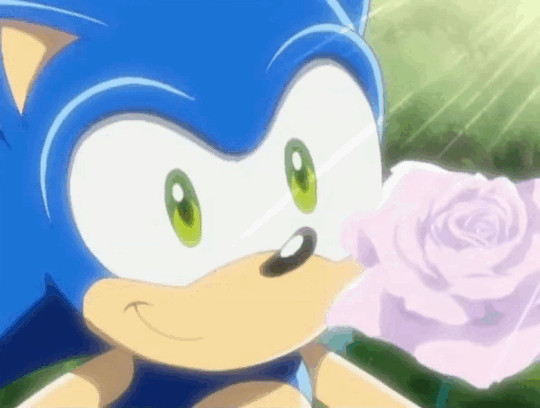
#and more examples I can’t remember off the top of my head!#why initiate when he can simply experience without having to be vulnerable#the key is understanding the difference between sonic running away from Amy and sonic RUNNING AWAY from Amy#because he has done both for different reasons#and in one he’s playing with her and in the other he doesn’t want some spell cast on him lol#sonic gives into Amy not because she bullies him but because he actually doesn’t hate being around her#also sonic and Chris are friends yall are just mean#sonic the hedgehog#amy rose#sonamy#sth#sonic#idw sonic#sonic X#Japanese sonic X#chris thorndyke#amy rose the hedgehog#character analysis#sonic characterization#sonic character analysis#sonic characters
209 notes
·
View notes
Text
I’m tired of Moon’s paranoia with Ruin at this point. It is a tired as fuck plotline that I’m just done with.
I’m at the point of ‘yeah, let him destroy his trust with others. See what it gets him. NOTHING.’ Because that’s how you lose friends. Accusing people of things they very clearly didn’t do is how you fuck up a perfectly good friendship.
I hope all this paranoia bullshit blows up in Moon’s face and Ruin refuses to accept an apology from him if Ruin turns out innocent.
#sun and moon show#sams#five nights at freddy's#fnaf#fnaf moon#fnaf ruin eclipse#queue#i’m tired of moon guys#something i never thought i’d say#because moon is my favorite from the sb game itself#i’m just tired of it#his paranoia is just getting me pissed off at this point#i understand that ruin was sus#but what he’s doing is completely unnecessary at this point#like you can’t talk to ruin like a normal fucking person!?#you can’t treat him with basic human (robot?) decency!?#he’s making me insanely angry lately#snoweytrashposts#snoweytalks#snoweyrambles#snoweyrants#tw cursing#sun and moon show spoilers#sams spoilers
94 notes
·
View notes
Text
some of you are just saying you headcannon Riz as Demi-romantic and Demi-sexual because you want to ignore that he’s aroace while pretending that you’re not ignoring that he’s aroace and it’s painfully obvious to actual aroace people.
-mod Riz
#fantasy high#d20#dimension 20#It’s like the Demi headcannons make all his aroace problems suddenly *disappear*#Like. There’s more to his aroace identity in the story than his sexuality!!! His biggest fear is that everyone is going to leave him!!!#Because he doesn’t understand them! Because he doesn’t love in the same way! Because they will move on and he can’t keep up!#It’s like people who headcannon him as Demi miss the entire fucking point#It’s not just his sexuality it’s his fears it’s his story!!!#Making a story which is like ‘all of that’s fixed now because he’s in a relationship with ‘insert character’’ is so fucking ajdnjdndjssj#How do you miss a point so fucking badly when it’s spelled out in front of you! He’s different!!!!!! HES DIFFERENT!!!#Demi headcannons for Riz aren’t bad it’s just they get rid of what makes this an aroace story when they write it!! They don’t understand it
62 notes
·
View notes
Text
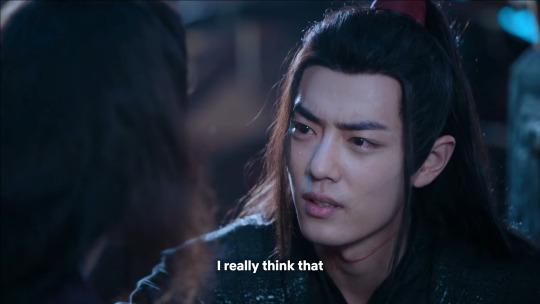
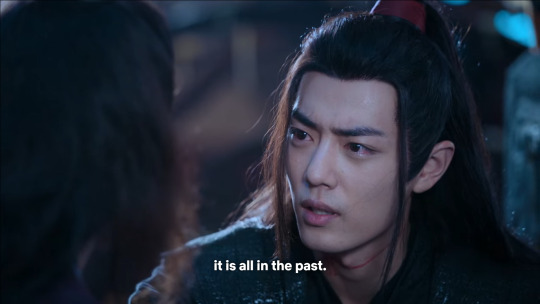


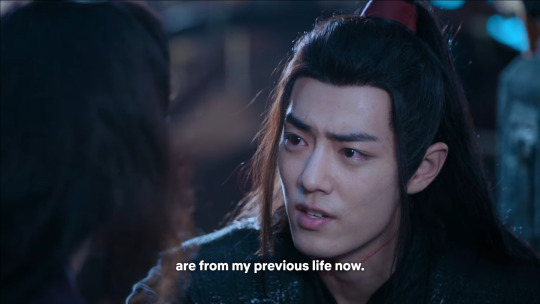
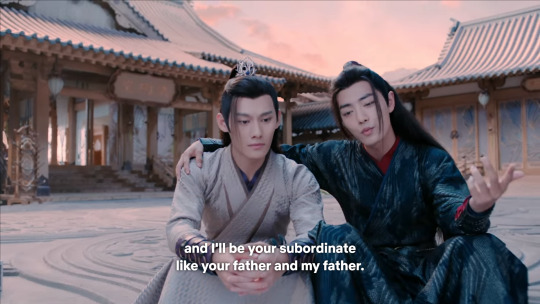
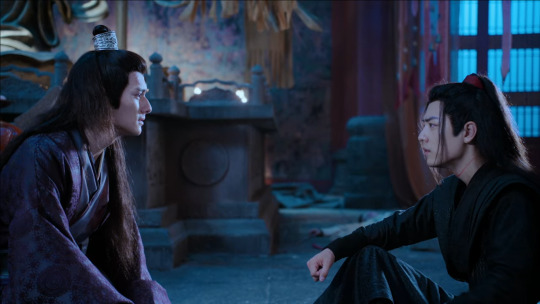
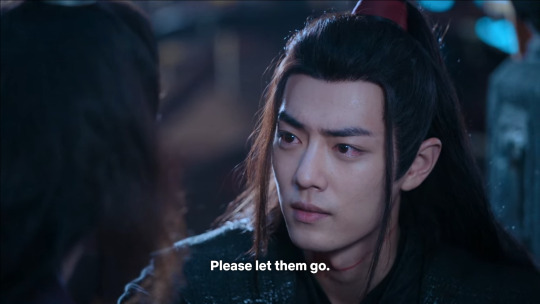
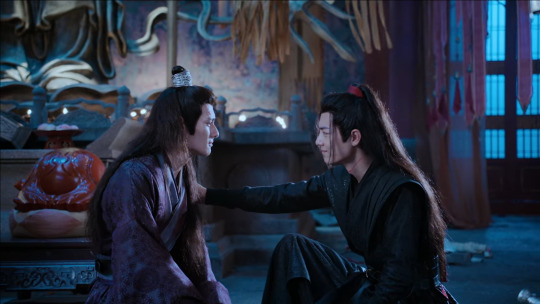
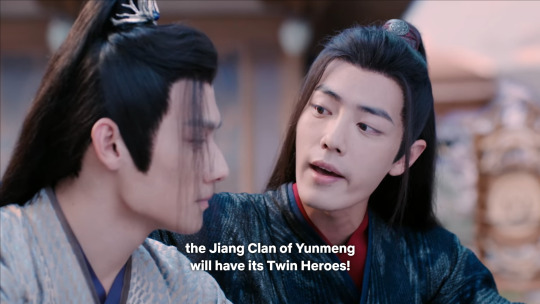
The Untamed, Ep. 11 // The Untamed, Ep. 48
#you can’t cross the distance to your brother but you can build a doorway to watch the loss through!!!#INSANE SHIT. GOD. HIS FACE. THE TRAGEDY OF LOSING SOMETHING AS YOU HOLD IT#AND MERLIN BADE FAREWELL TO THE KING HE HAD CREATED!!!#THIS HAPPENED LONG AGO NOTHING CAN BE DONE TO CHANGE IT!! FUCK. FUCK!!#Wei wuxian saying the cruelest thing he possibly could to his brother thinking it’s the kindest & just.#the way it world destroy both of them to know that. good. god.#the best part abt rewatching this series is 1.) I can understand what’s actually happening & the foreshadowing SLAYS & 2.) their relationsh#ip & seeing just how badly Wei wuxian backed himself in thta corner & Jiang cheng should have known to help him but he didn’t know how to lo#ok yet. because that came wijt time and experience and not having to build your home back up from the ground where evil people killed your p#arents & tortured your brother & now neither of you can really speak correctly to each other because there’s a gap#you don’t know how to cross because you don’t know yet who put it there#& then 16 years later in a temple you see what it is and why it’s there and that your brother will never#try to cross it because he thinks it’s a kindness#when all you’ve ever wanted was for him to stay.#ANYWAY. CRAZY HUH#the untamed#mdzs#jiang cheng#jiang wanyin#wei wuxian#wei wuxain#I don’t know the right spelling now these tags r making me doubt SO#wei ying
119 notes
·
View notes
Text
I have said it before, but Kilgharrah has a parallel-opposite arc to Morgana. His character is redeemed in the same streak of episodes where Morgana goes from an ally to a major villain. While Kilgharrah was often self-serving and manipulative in the first 2 seasons, this changes by the end of season 2 because Merlin chooses to show him mercy after incapacitating him. It’s the first real kindness that Kilgharrah has experienced in well over 20 years. Whereas, when Merlin shows Morgana mercy by making the deal with Morgause to save her after she’s been incapacitated, Morgana returns more vengeful than ever. Back to Kilgharrah, though…
Not only does he indebt himself to Merlin, he comes to see Merlin in an entirely new way. Before, when he would call Merlin kin, it was in the most literal sense—both are creatures of magic, cut from the same cloth, and should be allies. But now, they’ve formed a bond from that kinship (and in a literal soul connection sense, too, no less). Kilgharrah’s plea strikes Merlin with so much force because they’re both now the last of their kind, and Merlin cannot help but consider and understand what Kilgharrah has been through, despite the destruction he’s caused, because it’s happened to Merlin, too. When they see each other next, this is what they have to say:
Merlin: I didn't think you'd answer my call.
Kilgharrah: Merlin, I could not resist a dragonlord, even if I wanted to.
Merlin: I’m grateful, thank you.
Let’s focus on that: “…even if I wanted to.” Kilgharrah did not want to resist Merlin’s call for help because he’s come to care about Merlin in his own way. This development is easily traced back to Merlin’s show of mercy. It cannot be stressed enough: this was the first kindness Kilgharrah had been shown in over 20 years, after rotting away in a dungeon when he was betrayed in every way possible, suffering from the grief of his entire species going extinct on Uther’s orders. And with this one show of mercy, Merlin changed the heart of a creature that everyone had already dismissed as a monster (the same way Merlin sees himself), one who sought his revenge by razing an entire city to the ground. From the start, Merlin treats him as a person: “Why are you doing this? You’re killing innocent people!” No one who saw him as a mere beast acting on its true nature would ask a moral quandary of him. And in the end, this path leads to Kilgharrah being spared, and Camelot repeatedly being saved as a result.
Kilgharrah’s sincerity in his care for Merlin is consistent in later seasons, and is seen in more than just his rescues. In 4x02, he plainly urges Merlin not to sacrifice himself, despite the fact that Arthur’s life (and thus, Kilgharrah’s ultimate freedom) hangs in the balance.
Merlin: Arthur intends to sacrifice himself to heal the Veil. It is my destiny to protect him; you taught me that.
Kilgharrah: Merlin, you must not do this.
He shortly follows this with something we’ve known since Merlin mended the rift between them in 2x13:
Kilgharrah: From the moment I met you, I saw something that was invisible. Now, it is there for all to see […] It will be an empty world without you, young warlock.
Having failed to convince Merlin to let someone else be the sacrifice, Kilgharrah commends him. Not only that, Kilgharrah mourns him.
This is all to say that Kilgharrah’s actions in seasons 1 & 2 should not be the sole focal point for our judgment of him, when he undergoes such an extreme change of character. Furthermore, there is no reason to believe that Kilgharrah’s faith in the prophecies is anything but genuine. Alongside his newfound care for Merlin, his ultimate goal is his own freedom, and he believes that Arthur is the key to that.
Kilgharrah: We need Arthur to live […] Your destiny is to protect the young Pendragon until he claims his crown, and when he does, magic can be returned to the realm. Only then will I be free.
This logic is in line with what occurred in 5x13. Kilgharrah wouldn’t have said or done any of what he does in 1x13 if he did not believe that Arthur’s ascension to king would lead to his own freedom (even if it didn’t take immediate effect). Arthur’s place on the throne made room for an end to the wars, namely the one on magic. Kilgharrah did not make these prophecies up, nor is he the only one to believe in them. Alator and Finna possessed knowledge of the same prophecies, and both believed in Emrys’ vision/mission.
Kilgharrah had great knowledge himself, and tried to share that with Merlin to pave the best path, but he was not all-knowing, and he tells Merlin as much himself. Kilgharrah is merely a messenger, believer, and interpreter. So, he still believes the prophecy has come to pass, even if Arthur did end up dying anyways. The five kingdoms could now be united and magic restored to the land once the war was ended upon Morgana’s death. The prophecy was fulfilled within Arthur’s lifetime, despite the success of Arthur’s Bane. It did not go as Merlin expected, nor how Kilgharrah expected, but it still… went. This is what he means when he says, “No young man, no matter how great, can know his destiny.”
The idea that Kilgharrah simply played Merlin, when he was depending on Arthur as much as any creature of magic, and when he genuinely cared for Merlin as kin, is bad faith conjecture. How they got to the end point still mattered to him (i.e. Merlin must protect Arthur so that he has a chance to fulfill the prophecy), because that potential only existed through Arthur, and they all continued to suffer until that time came. Regardless of the age at which Arthur died, though, he was destined to fulfill these prophecies and return at Albion’s time of need. This, Kilgharrah knew. So is it any wonder that he maintained faith in it even after Arthur died? Especially after Arthur died, proving the prophecies true once again?
Kilgharrah: Merlin. There is nothing you can do.
Merlin: I've failed?
Kilgharrah: No, young warlock, for all that you have dreamt of building, has come to pass.
Merlin: I can't lose him! He's my friend!
Kilgharrah: Though no man, no matter how great, can know his destiny, some lives have been foretold. Merlin... Arthur is not just a King— he is the Once and Future King. Take heart, for when Albion's need is greatest, Arthur will rise again.
No, Kilgharrah did not predict the exact ending, but he did his best to help Merlin bring about the best possible outcome, and he said what he could to comfort Merlin when he was grieving Arthur. Kilgharrah was genuine, and his motives were in alignment with Merlin’s by the start of season 3.
#unpopular opinion#the only counterpoint is ‘what if he lied?’ which is just a Film Theory at this point#it’s an interesting headcanon but you can’t base your understanding of a character on a non-canon theory (or expect others to)#also: Kilgharrah doesn’t really tell direct lies at all through the series. at most he withholds some information#like when he knew that Merlin’s life wouldn’t be taken in the trade for Arthur’s life#and again. that whole episode only demonstrates Kilgharrah’s sheer belief in the prophecies surrounding Arthur. because why save him then?#it certainly wasn’t to get Merlin on his good side! he did the exact opposite there.#in fact… he is always at odds with Merlin. so… yeah.#kilgharrah#merlin emrys#merlin and kilgharrah#bbc merlin#merlin meta#my meta
231 notes
·
View notes
Text
#rhett and link#rhett and link edits#rhett mclaughlin#gmm 2520#“i was just being cute”#oh hell yes you are rhett#the way i can’t even understand why i was so hyperfixated on rhett today#woke up watching gmm and screaming nonsense because he is so breathtaking!?#but honestly the moment he said bitches i lost it#sprhinklesome edits
64 notes
·
View notes
Text

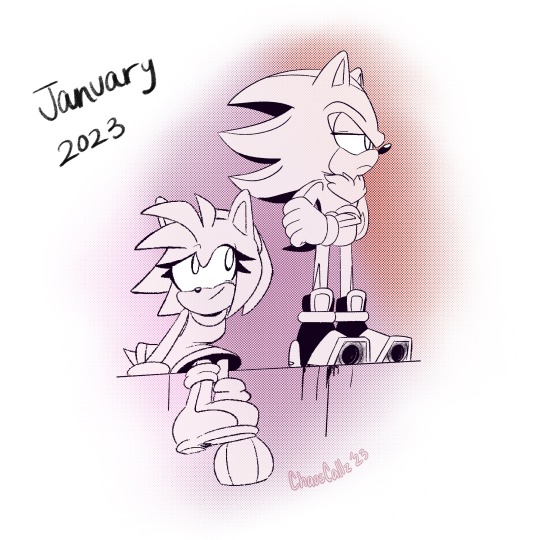
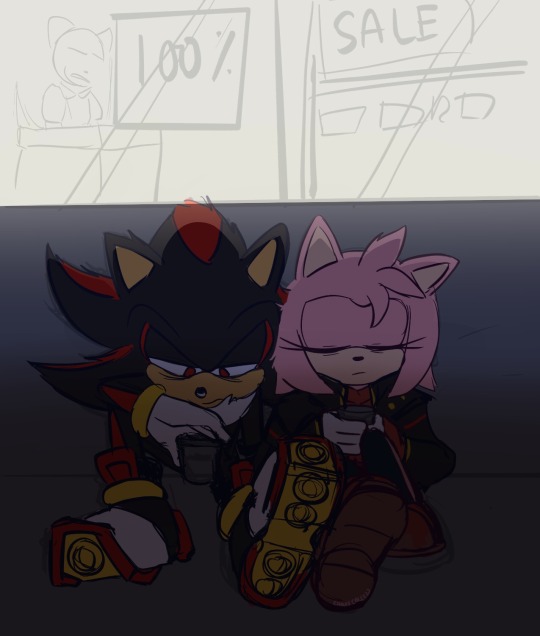
progress is progress for everyone, myself included c’: some practice pieces I’ve been working on with Shadow and Amy
#shadow the hedgehog#amy rose#shadamy#sonic fanart#onlyart#when the fanfics give you inspiration#cause they always do#had to get the wiggles out#wips I’ll probably never touch again#but thank you for being here#shadow looks so tired#Amy looks beyond compare#so like I’m gonna go on about this one#there’s a moment in the fic where they stop at a gas station#and they’re talking because shadow is just so done with life#he can’t even comprehend words that’s how done he is#it’s like 2am like dead of night and they’ve been on his bike#and Amy understands he can’t put his frustration into words#so she just SITS with him and is just PRESENT#and to compensate HER feelings shadow does this little toe touch thingie and#I DIED#cc's sketchbook
418 notes
·
View notes
Text
just finished the second season of black sails and i gotta say i understand why it makes queers go feral
#i’m frothing at the mouth#black sails#i watched the first season yesterday and didn’t really enjoy it much#the pacing is really weird the characterisation was shallow at best and the whole thing stank of game of thrones levels of forced edgyness#but man the second season slapped so hard full 180 turnaround#the flashbacks were expertly crafted all major characters have relatable motives and they pull through ruthlessly#their fatal flaws are right there and like a greek tradgedy it all happens exactly how it must#in revealing it’s nature as a character study of flint and of what broke him so utterly the pacing actually becomes so poignant and perfect#with each new bit of information we’re given we understand his urgency his ruthlessness his unwavering calm hatred#he’s turned himself into a proper fucking monster and it’s tragic because it could only have ever gone this way#there’s no way out and the show being a prequel we know he lives we know he can’t win#actually doomed by the narrative in the worst/best way#but by god i just want his to set the world aflame
58 notes
·
View notes
Text
Where’s that post I made about Mike being the companion that broke under the horrors bc I’m still right. When I think abt the THINGS some companions have had to endure and have still seemingly been fine, and then I think of mike losing himself and his values to a festering psychological wound that left him open to radicalisation, it’s like he is the evidence that actually everything isn’t fine.
Which is why it’s so important that he should be next seen in meditation, in the seeking of peace, in quietness and healing because not only is he a character that needs it he’s also a character that knows he needs it and seeks it out for himself, because he doesn’t recognise who he is anymore and he wants, not to redeem himself in the eyes of others (he won’t even go near UNIT, not even when he needs their help, he goes through Sarah Jane instead!), but to become a better person, to stop being a threat, and to heal for his own soul’s sake.
And so he goes from someone who was willing to see the entirety of human history erased, to someone who will risk his life for one person and the fact that that ultimately saves his life always imo comes across as a bit easy if you watch planet of the spiders without this context in mind. But when you do think about where Mike has been, psychologically, from the green death through to planet of the spiders, it doesn’t seem easy at all but actually a significant if understated character moment.
#mike yates#waxing lyrical about my blorbos in the middle of the night#but for real mikes healing arc is SO much to me#I think one of the crucial things about the green death is firstly that the doctor asks him to go back#like I genuinely think Mike would not have been as traumatised by his experiences as he was if he hadn’t IMMEDIATELY been forced back into#the traumatic situation#and the second thing is that Jo leaves at the end#mike is straight up NOT having a good time#like he goes through an extremely traumatic event and then has to immediately reexpose himself to it without any chance to process what happ#ened to him#and then he loses one of his best friends almost immediately afterwards#ESPECIALLY since jo would be the person MOST likely to understand what he is going through#and they both know that#the first day they met Jo was manipulated into attacking her friends by a power beyond her own will#which is exactly what has just happened to Mike#and Mike witnessed All of that so he knows. he KNOWS that jo would understand#but he can’t talk to her about it because she’s getting married and leaving
67 notes
·
View notes